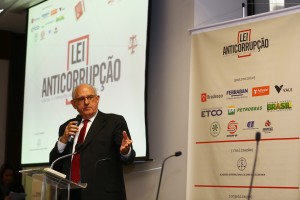The Constitution, Justice and Citizenship Commission (CCJ) approved, this Wednesday (4), in a supplementary shift, a proposal that foresees the participation of the Public Ministry, from the beginning, in leniency agreements signed by public agencies with companies responsible for practice of illegal acts in order to mitigate administrative sanctions. This type of agreement is provided for in the Anti-Corruption Law (12.846/2013).
Authored by Senator Ricardo Ferraço (PMDB-ES), the Senate Bill (PLS)105/2015, with changes in provisions of the Anticorruption Law, had already been accepted in a terminating decision by the Constitution, Justice and Citizenship Commission (CCJ) on October 28. With the final approval on Wednesday, the project should be sent directly to the Chamber of Deputies. The text accepted by the commission is a substitute for the rapporteur, Senator Randolfe Rodrigues (Rede-AP).
Omission
With the investigations of the Federal Police's Operation Car Wash, which found irregularities at Petrobras, Ferraço noted that the Anti-Corruption Law “sinned” by not providing for the participation of the Public Ministry in the construction of leniency agreements. For this reason, the bill determines that the Public Prosecutor's Office fully follow up on this procedure provided for in the Anti-Corruption Law, which, in its assessment, will give more legal certainty to the parties.
In the judicial sphere, the body may even sign leniency agreements in isolation or in conjunction with public law or the injured body. The project expands the effects of the agreements, now restricted to the administrative sphere, to include criminal action. Ferraço's expectation is that, thus, the companies involved will be safer to join.
- The proposal aims to end an omission of the law that creates legal uncertainty regarding the effects of the leniency agreement at the administrative level - he said.
Term
In addition to correcting the omission, the proposal extends the limitation period for those involved to join from five to 10 years. It also frees the company that signs the restrictive sanctions agreement on the right to participate in tenders and to sign contracts with the public administration.
Senator Romero Jucá (PMDB-RR), who participated in the understandings that resulted in the final text, considered the project relevant to the country's economy, as it gives more legal certainty to leniency agreements. Randolfe Rodrigues highlighted the need for the Public Ministry to be present in these agreements and highlighted Jucá's participation in the dialogue with the various stakeholders on the subject.
Source: The Senate Agency .







